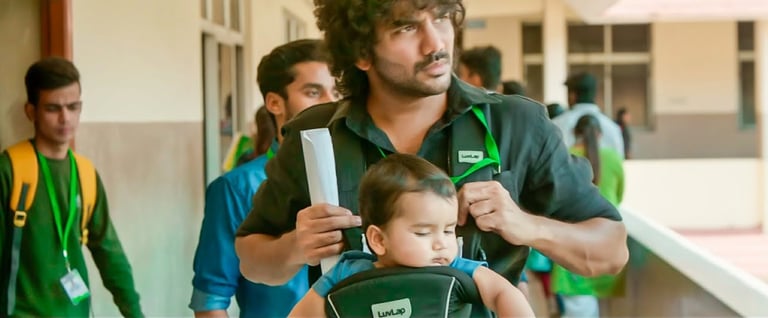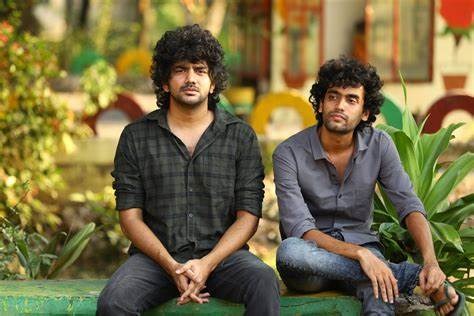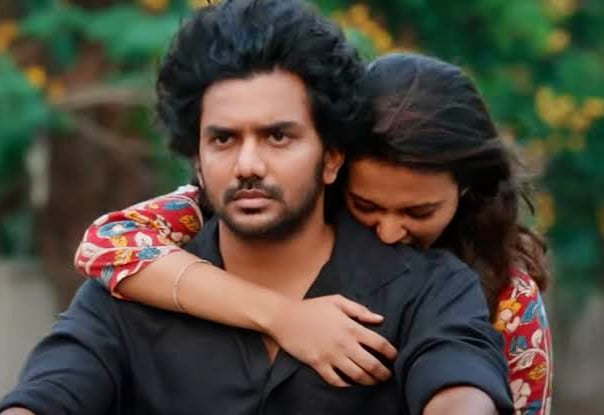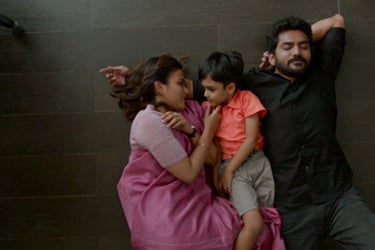"Dada Movie Review: A Heartwarming Tale of Love and Fatherhood "
In this movie review of Dada, Directed by Ganesh K. Babu, this 2023 Indian Tamil-language film is a not only explores the intricacies of relationships but also paints a poignant picture of the transformative power of fatherhood.
11/9/20234 min read


In the realm of cinema, where love stories often tread familiar paths, "Dada" emerges as a refreshing breeze, weaving a narrative that transcends the boundaries of romantic love and delves deep into the uncharted territories of parenthood. Directed by Ganesh K. Babu, this 2023 Indian Tamil-language film is a coming-of-age romantic drama that not only explores the intricacies of relationships but also paints a poignant picture of the transformative power of fatherhood.


The film kicks off with a scene that immediately sets the tone for the emotional rollercoaster that awaits the audience. Sindhu's profound love for Mani is easily sensed as she sleeps on his arm, her gaze fixed on him with an intensity that mirrors the depth of her emotions. This initial glimpse into their relationship lays the foundation for a story that unfolds with love as its driving force.
Manikandan and Sindhu, portrayed by the talented Kavin and Aparna Das, are final-year college students deeply in love. However, their lives take an unexpected turn when Sindhu becomes pregnant. The decision to keep the child becomes a pivotal point in their relationship, leading to a cascade of events that shape the narrative.
Mani, portrayed by Kavin, takes up a job in a factory, and the couple rents a house, eager to build a life together. However, the stresses of life take a toll on Mani, leading him to seek solace in alcohol. The resulting mistreatment of Sindhu strains their relationship, culminating in a fateful day when a heated argument leaves Sindhu sick and unable to reach Mani.
Then revelation of Sindhu giving birth without Mani's knowledge adds a layer to the story. The audience, much like Mani, is left grappling with the sudden disappearance of Sindhu. As he attempts to search for her, the heartbreaking assumption that she abandoned their child haunts both Mani and the viewer.


The turning point arrives when Mani decides to give the baby to an orphanage. However, in a moment of clarity and a surge of paternal instinct, he rushes back to retrieve his child. This decision becomes the catalyst for Mani's transformation from a troubled young man to a devoted and responsible single father.
The portrayal of Mani's journey as a single father is where "Dada" truly shines. The transition from a man drowning in the bottle of alcohol to a caring father feeding his son with a bottle of milk is not just heartwarming but also a testament to the film's exploration of personal growth and redemption.
One of the most endearing aspects of the movie is how Mani fearlessly carries his child to college, defying societal norms and expectations. This unapologetic display of fatherly love challenges conventional notions and adds a layer of authenticity to the characters.
As Adithya, Mani's child, grows older, the bond between father and son deepens. The movie masterfully captures the essence of their relationship, making it relatable and heart-touching for the audience. One of the most endearing moments in the film is when Adithya, Mani's child, utters his first words— "dada." The sheer innocence and depth of this scene tug at the heartstrings, leaving the audience emotionally invested in the father-son relationship that unfolds as Adithya grows older.
There is one scene within the movie, when Mani asks his child casually, Aditya, what do you want to do in life? Adithya says “Work”, Mani laughs and asks, "What kind of work?" In a moment of innocence, Aditya responds, "I'm gonna make sure everyone studies in the same school, that kind of work." This profound thought from a child, understood by him but not by us, adds a layer of depth to the narrative.


While the audience is gripped by the unfolding father-son tale, the enigmatic absence of Sindhu lingers in the background, raising questions and doubts. The initial image of a deeply in-love Sindhu taking a stand to keep the child sharply contrasts with the mystery surrounding her departure. However, as the narrative progresses and Mani secures a job in the same office as Sindhu, the film skillfully unravels the reasons behind her actions,
providing a satisfying resolution to the audience's lingering queries.
What makes "Dada" special is its ability to navigate the complexities of life decisions, especially those related to marriage and parenthood. The film challenges the audience to contemplate whether they possess the courage exhibited by Mani in the face of normal life pressures and the additional weight of fatherhood.
The portrayal of everyday struggles and the relentless pressures of life resonates with viewers on a personal level. The film becomes a mirror reflecting the challenges of adulthood, urging the audience to question their capacities to navigate similar pressures.


In conclusion, "Dada" is a cinematic gem that goes beyond the conventional boundaries of love stories. It explores the profound depths of parenthood, encapsulating the joys, challenges, and redemptive qualities that come with the territory. With stellar performances, a compelling narrative, and a poignant exploration of human relationships, "Dada" stands as a testament to the enduring power of love and the transformative journey of fatherhood. It is not just a movie that tells us about true love; it is a movie that makes us feel it in every frame and leaves an indelible mark on the heart.



